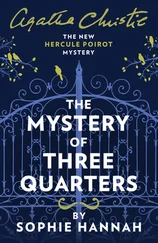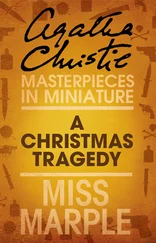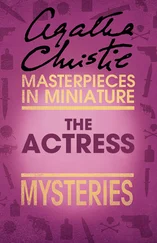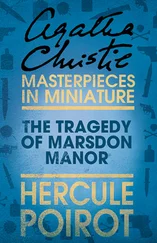Agatha Christie - Three Act Tragedy
Здесь есть возможность читать онлайн «Agatha Christie - Three Act Tragedy» весь текст электронной книги совершенно бесплатно (целиком полную версию без сокращений). В некоторых случаях можно слушать аудио, скачать через торрент в формате fb2 и присутствует краткое содержание. Жанр: Классический детектив, на английском языке. Описание произведения, (предисловие) а так же отзывы посетителей доступны на портале библиотеки ЛибКат.
- Название:Three Act Tragedy
- Автор:
- Жанр:
- Год:неизвестен
- ISBN:нет данных
- Рейтинг книги:4.5 / 5. Голосов: 2
-
Избранное:Добавить в избранное
- Отзывы:
-
Ваша оценка:
- 100
- 1
- 2
- 3
- 4
- 5
Three Act Tragedy: краткое содержание, описание и аннотация
Предлагаем к чтению аннотацию, описание, краткое содержание или предисловие (зависит от того, что написал сам автор книги «Three Act Tragedy»). Если вы не нашли необходимую информацию о книге — напишите в комментариях, мы постараемся отыскать её.
Three Act Tragedy — читать онлайн бесплатно полную книгу (весь текст) целиком
Ниже представлен текст книги, разбитый по страницам. Система сохранения места последней прочитанной страницы, позволяет с удобством читать онлайн бесплатно книгу «Three Act Tragedy», без необходимости каждый раз заново искать на чём Вы остановились. Поставьте закладку, и сможете в любой момент перейти на страницу, на которой закончили чтение.
Интервал:
Закладка:
“And the drinks?”
“He went round with the wine, sir. Sherry first, with the soup, and then hock and claret. But what could he have done, sir? If there’d been anything in the wine he’d have poisoned everybody – or all those who took it. It’s not as though the master had anything that nobody else had. The same thing with the port. All the gentlemen had port, and some of the ladies.”
“The wine glasses were taken out on a tray?”
“Yes, sir, I held the tray and Mr. Ellis put the glasses on it, and I carried the tray out to the pantry, and there they were, sir, when the police came to examine them. The port glasses were still on the table. And the police didn’t find anything.”
“You’re quite sure that the doctor didn’t have anything to eat or drink at dinner that nobody else had?”
“Not that I saw, sir. In fact, I’m sure he didn’t.”
“Nothing that one of the guests gave him – ”
“Oh, no, sir.”
“Do you know anything about a secret passage, Alice?”
“One of the gardeners told me something about it. Comes out in the wood where there’s some old walls and things tumbled down. But I’ve never seen any opening to it in the house.”
“Ellis never said anything about it?”
“Oh, no, sir, he wouldn’t know anything about it, I’m sure.”
“Who do you really think killed your master, Alice?”
“I don’t know, Sir. I can’t believe anyone did… I feel it must have been some kind of accident.”
“H’m. Thank you, Alice.”
“If it wasn’t for the death of Babbington,” said Sir Charles as the girl left the room, “we could make her the criminal. She’s a good-looking girl… And she waited at table… No, it won’t do. Babbington was murdered; and anyway Tollie never noticed good-looking girls. He wasn’t made that way.”
“But he was fifty-five,” said Mr. Satterthwaite thoughtfully.
“Why do you say that?”
“It’s the age a man loses his head badly about a girl – even if he hasn’t done so before.”
“Dash it all, Satterthwaite, I’m - er – getting on for fifty-five.”
“I know,” said Satterthwaite.
And before his gentle twinkling gaze Sir Charles’s eyes fell.
Unmistakably he blushed…
10
“How about an examination of Ellis’s room?” asked Mr. Satterthwaite, having enjoyed the spectacle of Sir Charles’s blush to the full.
The actor seized at the diversion.
“Excellent, excellent. Just what I was about to suggest myself.”
“Of course the police have already searched it thoroughly.”
“The police – ”
Aristide Duval waved the police away scornfully. Anxious to forget his momentary discomfiture, he flung himself with renewed vigour into his part.
“The police are blockheads,” he said sweepingly. “What have they looked for in Ellis’s room? Evidences of his guilt. We shall look for evidences of his innocence – an entirely different thing.”
“You’re completely convinced of Ellis’s innocence?”
“If we’re right about Babbington, he must be innocent.”
“Yes, besides – ”
Mr. Satterthwaite did not finish his sentence. He had been about to say that if Ellis was a professional criminal who had been detected by Sir Bartholomew and had murdered him in consequence the whole affair would become unbearably dull. Just in time he remembered that Sir Bartholomew had been a friend of Sir Charles Cartwright’s and was duly appalled by the callousness of the sentiments he had nearly revealed.
At first sight Ellis’s room did not seem to offer much promise of discovery. The clothes in the drawers and hanging in the cupboard were all neatly arranged. They were well cut, and bore different tailors’ marks. Clearly cast-offs given him in different situations. The underclothing was on the same scale. The boots were neatly polished and arranged on trees.
Mr. Satterthwaite picked up a boot and murmured, “Nines, just so, nines.” But since there were no footprints in the case, that didn’t seem to lead anywhere.
It seemed clear from its absence that Ellis had departed in his butler’s kit, and Mr. Satterthwaite pointed out to Sir Charles that that seemed rather remarkable fact.
“Any man in his senses would have changed into an ordinary suit.”
“Yes, it’s odd that… Looks almost, though that’s absurd, as if he hadn’t gone at all… Nonsense, of course.”
They continued their search. No letters, no papers, except a cutting from a newspaper regarding a cure for corns, and a paragraph relating to the approaching marriage of a duke’s daughter.
There was a small blotting-book and a penny bottle of ink on a side table – no pen. Sir Charles held up the blotting-book to the mirror, but without result. One page of it was very much used – a meaningless jumble, and the ink looked to both men old.
“Either he hasn’t written any letters since he was here, or he hasn’t blotted them,” deduced Mr. Satterthwaite. “This is an old blotter. Ah, yes – ” With some gratification he pointed to a barely decipherable “L. Baker” amidst the jumble.
“I should say Ellis hadn’t used this at all.”
“That’s rather odd, isn’t it?” said Sir Charles slowly.
“What do you mean?”
“Well, a man usually writes letters…”
“Not if he’s a criminal.”
“No, perhaps you’re right… There must have been something fishy about him to make him bolt as he did… All we say is that he didn’t murder Tollie.”
They hunted round the floor, raising the carpet, looking under the bed. There was nothing anywhere, except a splash of ink beside the fireplace. The room was disappointingly bare.
They left it in a somewhat disconcerted fashion. Their zeal as detectives was momentarily damped.
Possibly the thought passed through their minds that things were arranged better in books.
They had a few words with the other members of the staff, scared-looking juniors in awe of Mrs. Leckie and Beatrice church, but they elicited nothing further.
Finally they took their leave.
“Well, Satterthwaite,” said Sir Charles as they strolled across the park (Mr. Satterthwaite’s car had been instructed to pick them up at the lodge) “anything strike you – anything at all?”
Mr. Satterthwaite thought. He was not to be hurried into an answer – especially as he felt something ought to have struck him. To confess that the whole expedition had been a waste of time was an unwelcome idea. He passed over in his mind the evidence of one servant after another – the information was extraordinarily meagre.
As Sir Charles had summed it up just now, Miss Wills had poked and pried, Miss Sutcliffe had been very upset, Mrs. Dacres had not been upset at all, and Captain Dacres had got drunk. Very little there, unless Freddie Dacres’s indulgence showed the deadening of a guilty conscience. But Freddie Dacres, Mr. Satterthwaite knew, quite frequently got drunk.
“Well?” repeated Sir Charles impatiently.
“Nothing,” confessed Mr. Satterthwaite reluctantly. “Except – well, I think we are entitled to assume from the clipping we found that Ellis suffered from corns.”
Sir Charles gave a wry smile.
“That seems quite a reasonable deduction. Does it – er – get us anywhere?”
Mr. Satterthwaite confessed that it did not.
“The only other thing -” he said and then stopped.
“Yes? Go on, man. Anything may help.”
“It struck me as a little odd the way that Sir Bartholomew chaffed his butler – you know what the housemaid told us. It seems somehow uncharacteristic.”
“It was uncharacteristic,” said Sir Charles with emphasis. “I knew Tollie well – better than you did – and I can tell you that he wasn’t a facetious sort of man. He’d never have spoken like that unless – well, unless for some reason he wasn’t quite normal at the time. You’re right, Satterthwaite, that is a point. Now where does it get us?”
Читать дальшеИнтервал:
Закладка:
Похожие книги на «Three Act Tragedy»
Представляем Вашему вниманию похожие книги на «Three Act Tragedy» списком для выбора. Мы отобрали схожую по названию и смыслу литературу в надежде предоставить читателям больше вариантов отыскать новые, интересные, ещё непрочитанные произведения.
Обсуждение, отзывы о книге «Three Act Tragedy» и просто собственные мнения читателей. Оставьте ваши комментарии, напишите, что Вы думаете о произведении, его смысле или главных героях. Укажите что конкретно понравилось, а что нет, и почему Вы так считаете.












